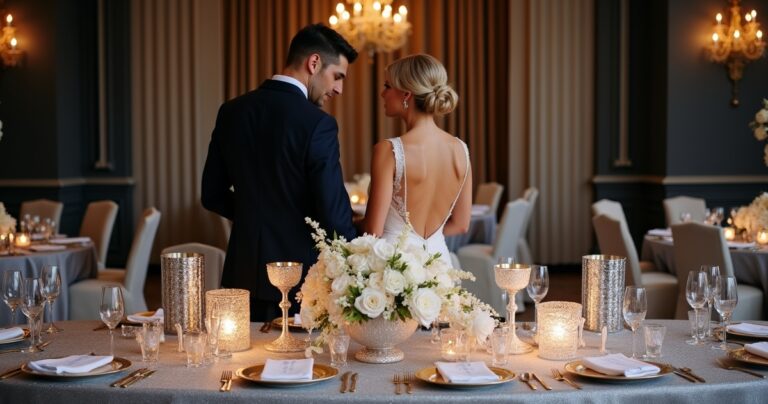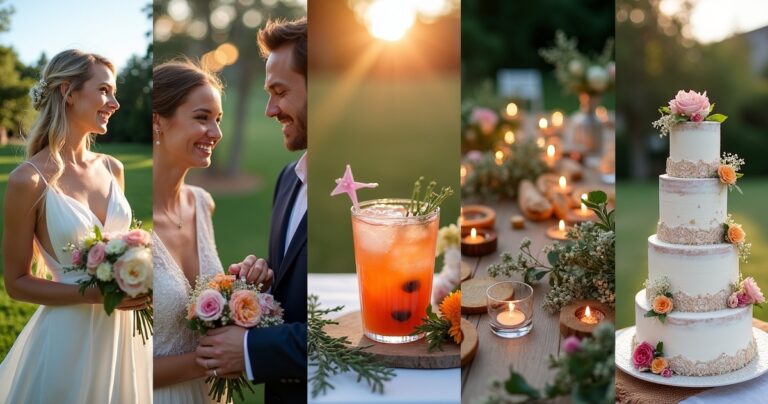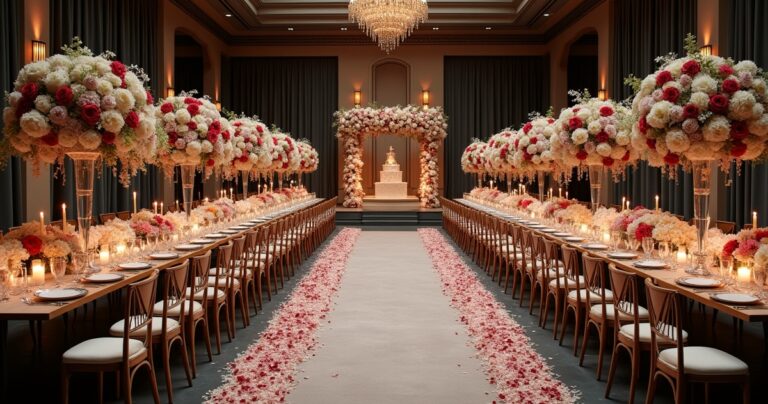Planning a wedding is an exciting yet intricate journey that requires careful consideration and organization. From setting a budget to choosing the perfect venue, every detail plays a crucial role in creating a memorable day. This comprehensive guide will walk you through the essential steps to plan a wedding, ensuring a seamless and stress-free experience.
Essential Steps to Plan a Wedding
Set Your Wedding Budget
Setting a wedding budget is the cornerstone of your planning process. It determines the scope of your celebration and helps prioritize expenses. Begin by discussing with your partner and any contributing family members to establish a realistic budget. Consider all potential costs, including venue, attire, catering, and entertainment.
- Determine your total budget : Include contributions from family.
- Allocate funds : Prioritize key elements like venue and catering.
- Track expenses : Use a spreadsheet or app to monitor spending.
Determine Your Wedding Style
Your wedding style reflects your personality and sets the tone for the entire event. Whether you envision a rustic barn wedding or a glamorous ballroom affair, defining your style will guide your decisions on decor, attire, and more. Explore various themes and color palettes to find what resonates with you.
- Explore themes : Rustic, vintage, modern, etc.
- Choose a color palette : Complement your theme.
- Incorporate personal touches : Reflect your unique story.
Create a Master Checklist
A master checklist is your roadmap to a successful wedding. It outlines every task, from booking vendors to sending invitations, ensuring nothing is overlooked. Break down tasks by month and prioritize them based on urgency.
- List all tasks : From booking venues to finalizing the guest list.
- Set deadlines : Assign completion dates for each task.
- Review regularly : Update as tasks are completed.
Choose Your Wedding Date and Season
Selecting a wedding date is a pivotal decision that impacts venue availability, guest attendance, and overall ambiance. Consider the season, weather, and any significant dates that hold personal meaning. Popular months like June and September may require booking well in advance.
- Consider the season : Weather and availability.
- Check significant dates : Anniversaries, holidays.
- Book early : Secure your preferred date and venue.
Wedding Venues and Vendors
Research Venue Options
The venue sets the stage for your wedding and should align with your style and budget. Research various options, from traditional banquet halls to unique outdoor spaces. Visit potential venues to assess their amenities, capacity, and ambiance.
- Visit multiple venues : Compare options and amenities.
- Consider logistics : Accessibility, parking, and accommodations.
- Ask about packages : Inclusions and additional costs.
Book Key Wedding Vendors
Vendors play a crucial role in bringing your vision to life. From photographers to florists, booking reputable vendors early ensures availability and quality service. Seek recommendations and read reviews to make informed decisions.
- Prioritize key vendors : Photographer, caterer, florist.
- Read reviews : Check testimonials and portfolios.
- Negotiate contracts : Clarify terms and conditions.
Hire a Wedding Planner
A wedding planner can alleviate stress and streamline the planning process. They offer expertise, vendor connections, and creative ideas to enhance your celebration. Consider hiring a planner if you have a busy schedule or desire professional guidance.
- Evaluate experience : Check credentials and past events.
- Discuss services : Full planning or day-of coordination.
- Set a budget : Ensure affordability and value.
Wedding Guest List and Invitations
Create Your Guest List
Crafting a guest list requires careful consideration of your budget and venue capacity. Start with immediate family and close friends, then expand to extended family and acquaintances. Be prepared to make adjustments as needed.
- Prioritize guests : Immediate family and close friends.
- Consider venue capacity : Align with your budget.
- Be flexible : Adjust as necessary.
Choose and Send Save-the-Dates
Save-the-dates are a courteous way to inform guests of your wedding date and location. Send them 6-8 months in advance, especially for destination weddings. Include essential details and a link to your wedding website for updates.
- Include essential details : Date, location, and website link.
- Send early : 6-8 months before the wedding.
- Personalize design : Reflect your wedding theme.
Select Wedding Invitations
Wedding invitations set the tone for your celebration and provide crucial information to guests. Choose a design that complements your theme and includes all necessary details, such as RSVP instructions and dress code.
- Choose a design : Match your wedding style.
- Include essential details : Date, time, location, RSVP.
- Order early : Allow time for printing and mailing.
Wedding Website and Registry
Build Your Wedding Website
A wedding website is a convenient platform to share information with guests. Include details about the venue, accommodations, and schedule. Update it regularly with any changes or additional information.
- Include key information : Venue, schedule, accommodations.
- Update regularly : Reflect any changes or additions.
- Personalize content : Share your love story and photos.
Set Up Your Wedding Registry
A wedding registry guides guests in selecting gifts that suit your needs and preferences. Choose a variety of items at different price points and include experiences or charitable donations for a unique touch.
- Select diverse items : Different price points and categories.
- Include experiences : Honeymoon funds or activities.
- Update regularly : Reflect any changes or additions.
Wedding Attire and Beauty
Shop for Wedding Dresses and Suits
Finding the perfect attire is a significant aspect of wedding planning. Start shopping early to allow time for fittings and alterations. Consider your wedding style and venue when selecting your dress or suit.
- Start early : Allow time for fittings and alterations.
- Consider your style : Match your wedding theme.
- Budget accordingly : Include accessories and alterations.
Plan Hair and Makeup
Hair and makeup complete your wedding day look. Schedule trials with stylists to find the perfect style that complements your attire and enhances your natural beauty. Consider the weather and venue when choosing your look.
- Schedule trials : Test different styles and products.
- Consider the weather : Choose long-lasting products.
- Coordinate with attire : Complement your dress or suit.
How much does it cost to plan a wedding?
T he average cost to plan a wedding in 2025 was 8,000. This figure includes expenses such as venue, catering, attire, and entertainment. However, costs can vary significantly based on location, guest count, and personal preferences.
What is the first step to plan a wedding?
The first step to plan a wedding is setting a budget and determining your priorities as a couple. This foundational step guides all subsequent decisions and ensures a cohesive and enjoyable planning process.
How far in advance should you plan a wedding?
Experts recommend starting to plan a wedding 12-18 months in advance, especially for larger celebrations. This timeline allows ample time to secure venues, book vendors, and make necessary arrangements.
Wedding Day Timeline and Logistics
Create a Wedding Day Schedule
A detailed wedding day schedule ensures a smooth and organized event. Outline the timing for each activity, from getting ready to the ceremony and reception. Share the schedule with vendors and key participants.
- Outline activities : Getting ready, ceremony, reception.
- Include buffer time : Allow for unexpected delays.
- Share with vendors : Ensure everyone is informed.
Plan Transportation
Transportation logistics are crucial for ensuring guests and the wedding party arrive on time. Consider hiring a shuttle service or arranging carpooling for convenience and safety.
- Arrange transportation : For guests and wedding party.
- Consider logistics : Parking and accessibility.
- Plan for contingencies : Backup options for delays.
Arrange Accommodations for Guests
Providing accommodation options for out-of-town guests is a thoughtful gesture. Reserve room blocks at nearby hotels and include this information on your wedding website.
- Reserve room blocks : At nearby hotels.
- Include information : On your wedding website.
- Consider guest needs : Accessibility and amenities.
Wedding Ceremony and Reception Details
Design Ceremony Layout
The ceremony layout sets the stage for your vows and should reflect your style and preferences. Consider seating arrangements, decor, and any special elements you wish to include.
- Plan seating : Consider guest comfort and visibility.
- Incorporate decor : Reflect your wedding theme.
- Include special elements : Personal touches or traditions.
Create Seating Charts
Seating charts ensure a smooth transition from ceremony to reception. Consider relationships and dynamics when assigning seats, and provide clear signage for guests.
- Consider relationships : Family dynamics and friendships.
- Provide clear signage : For easy navigation.
- Update as needed : Reflect any changes or additions.
Plan Reception Menu and Decor
The reception menu and decor create a memorable experience for guests. Choose a menu that suits your style and dietary preferences, and design decor that complements your theme.
- Select a menu : Consider dietary restrictions and preferences.
- Design decor : Match your wedding theme.
- Coordinate with vendors : Ensure seamless execution.
What should be included in a wedding planning checklist?
A comprehensive wedding planning checklist should include budget, venue, vendors, attire, guest list, invitations, and timeline. This ensures all aspects of the wedding are covered and organized.
How can I plan a wedding on a budget?
To plan a wedding on a budget, prioritize expenses, consider off-peak dates, and explore DIY options for decor and favors. This approach allows for a beautiful celebration without overspending.
Wedding Photography and Videography
Choose a Wedding Photographer
Selecting a skilled photographer is essential for capturing your special day. Review portfolios, meet with potential photographers, and discuss your vision and expectations.
- Review portfolios : Assess style and quality.
- Meet in person : Discuss vision and expectations.
- Clarify packages : Understand pricing and inclusions.
Decide on Videography Services
Videography captures the essence of your wedding day in motion. Consider hiring a videographer to create a lasting memory of your celebration. Discuss style, coverage, and editing preferences.
- Evaluate style : Documentary, cinematic, etc.
- Discuss coverage : Ceremony, reception, special moments.
- Review editing options : Highlight reels, full-length videos.
Create a Shot List
A shot list ensures all important moments are captured. Collaborate with your photographer and videographer to outline must-have shots, including family portraits and candid moments.
- List must-have shots : Family portraits, candid moments.
- Coordinate with vendors : Ensure coverage of key events.
- Review and update : Reflect any changes or additions.
Personal Touches and Special Moments
Write Wedding Vows
Writing personal vows adds a heartfelt touch to your ceremony. Reflect on your relationship and express your love and commitment in your own words. Practice reading them aloud to ensure comfort and clarity.
- Reflect on your relationship : Share personal stories and promises.
- Practice reading aloud : Ensure comfort and clarity.
- Keep it concise : Focus on meaningful sentiments.
Plan Unique Wedding Traditions
Incorporating unique traditions adds a personal touch to your wedding. Consider cultural customs, family rituals, or new traditions that hold special meaning for you and your partner.
- Explore cultural customs : Reflect your heritage.
- Include family rituals : Honor your loved ones.
- Create new traditions : Personalize your celebration.
Incorporate Family Heirlooms
Family heirlooms add sentimental value to your wedding. Consider wearing a piece of jewelry, using a family veil, or incorporating heirlooms into your decor.
- Wear heirloom jewelry : Add sentimental value.
- Use a family veil : Honor tradition.
- Incorporate into decor : Display cherished items.
Post-Wedding Tasks
Send Thank You Notes
Expressing gratitude to your guests is an important post-wedding task. Send personalized thank you notes to everyone who attended and contributed to your celebration.
- Personalize messages : Reflect on shared moments.
- Send promptly : Within three months of the wedding.
- Include a photo : Add a personal touch.
Preserve Wedding Memories
Preserving your wedding memories ensures they last a lifetime. Consider creating a photo album, framing your favorite pictures, or storing your dress and accessories.
- Create a photo album : Showcase your favorite moments.
- Frame pictures : Display cherished memories.
- Store dress and accessories : Preserve for future generations.
Change Name (If Applicable)
If you choose to change your name, complete the necessary legal steps. Update your identification, bank accounts, and other important documents.
- Update identification : Driver’s license, passport.
- Change bank accounts : Reflect your new name.
- Notify relevant parties : Employers, insurance providers.
FAQs
How long does it take to plan a wedding?
The time it takes to plan a wedding varies based on the size and complexity of the event. On average, couples spend 12-18 months planning their wedding to ensure all details are covered.
What is the most important aspect of wedding planning?
Setting a budget is the most important aspect of wedding planning. It guides all other decisions and ensures a cohesive and enjoyable planning process.
How can I make my wedding unique?
To make your wedding unique, incorporate personal touches and traditions that reflect your relationship. Consider writing your own vows, including family heirlooms, and creating new traditions.







